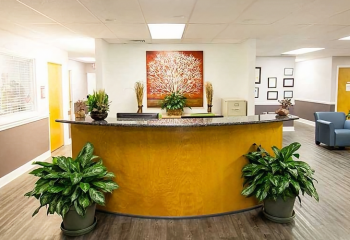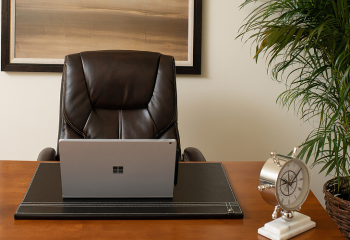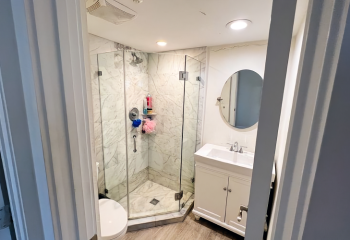Learn More

Best ADHD and ADD Treatment Centers in Florida
Our independent research team continuously gathers and evaluates data to compile an unbiased and thorough list of the best treatment centers for adhd, add.
Featured ADHD and ADD Treatment Centers
Ad Disclosure
77 Best Centers in Florida
How We Sort Our Results
How We Sort Our Results
How We Sort Our Results
Learn More
Top Treatment Locations
More About ADHD and ADD Treatment Centers
ADHD, or attention deficit hyperactivity disorder, is a complex disorder that can manifest in both children and adults. It's characterized by symptoms of inattention, hyperactivity, and impulsivity. The disorder is clinically defined, with inattention and hyperactivity/impulsivity being its main symptom domains.
Someone with ADHD may struggle to focus on their work or school, easily become distracted, and forget tasks and deadlines. They may also run late to appointments, work, and school. And for someone with ADHD, "easy" tasks, like cleaning the kitchen, may take longer as their brains become distracted and disinterested.
Executive dysfunction, distraction, and forgetfulness can lead to shame, anxiety, and depression in those with ADHD. Though ADHD is a common disorder, it's also highly treatable.
What Are the Symptoms of ADHD?
The symptoms of ADHD differ from "normal" inattention and executive dysfunction because they affect and impair your daily ability to function. Each symptom is more severe and frequent than the occasional "brain fart" or brain fog. Men usually have symptoms of hyperactivity, while women primarily present inattention symptoms.
See some of ADHD's symptoms below.
- Overlooking details and making seemingly careless mistakes at work, school, and at home. For example, you may misread a date and submit an assignment too late, email the wrong people, or sabotage your cooking efforts by leaving the stove on.
- Struggling to pay attention during conversations, when listening to lectures, and when working on a task. Your brain may jump from thought to thought, making it hard to listen when someone's talking to you or when you have a more meticulous task to complete.
- It's difficult to finish chores, tasks, and schoolwork. You may become distracted or bored before completing the task, leaving it unfinished.
- Avoiding tasks you know will take mental effort and time. This can then lead to procrastination, stress, and anxiety.
- Fidgeting and squirming. Sitting still during school, work, or just at home may feel impossible. For example, you may bounce your leg, wring your hands, or frequently change your sitting position to satisfy your hyperactive brain.
- Talking too much. You may speak every thought that comes to mind to expend energy and have something to do.
- Interrupting others, finishing their sentences, and cutting them off in conversations. You might struggle to wait your turn in conversations and let others finish their thoughts.
Symptoms of ADHD commonly begin between 3-6 years old and continue into adulthood. Your symptoms can also change as you get older. For example, as a kid, you may have struggled more with hyperactivity, then inattention as you got older.
What Causes ADHD?
Scientists don't yet know the cause of ADHD, but genetics and environmental factors seem like key contributors. They know it's more common in men and that women usually have primary inattention symptoms, while men have more hyperactive symptoms.
Having ADHD also means you're more likely to have a co-occurring disorder like anxiety, depression, dyslexia, and a substance use disorder.
How Is ADHD Diagnosed?
A primary care doctor usually makes the diagnosis during childhood. However, some symptoms of ADHD, like inattention, can delay the diagnosis. Teachers, parents, and doctors may assume a child needs to focus better and take their schoolwork seriously until other symptoms appear.
To receive a diagnosis, your primary doctor or a psychologist evaluates your symptoms and their severity. The symptoms must also be chronic and have a lasting effect on your day-to-day life. Providers then rule out other conditions, like sleep disorders, stress, depression, and anxiety, which can cause similar symptoms. If you get diagnosed, you'll then start treatment for ADHD.
How Can I Find Support?
- Rehabs for ADHD
- Telehealth Provider
- Talk to a supportive friend or family member
- Talk to your primary care physician
- National Helplines
Do Rehabs Treat ADHD?
Yes, some rehabs will treat primary ADHD. Many rehab centers also treat co-occurring mental health disorders like ADHD alongside substance use disorders. You can attend several levels of treatment for ADHD. These include:
- Outpatient, where you meet once or twice a week with others in treatment and your care provider.
- Intensive outpatient, where you meet 3-5 times a week for several hours for more intensive care.
- Partial hospitalization, where you meet 5-7 times a week for a full day, or most of one.
- Residential, where you live in a rehab center for 28+ days and engage in treatment with a community of peers and treatment providers.
- Inpatient, where you live in a treatment center or hospital and receive 24/7 monitoring.
In each level of care, you'll likely receive 1-1 therapy with a therapist and participate in group therapy. The exact type of therapies used will vary based on your symptoms, medical history, age, and more. But you can expect to engage in one or more types of evidence-based therapy throughout your treatment.
What Therapies Are Used to Treat ADHD?
- Cognitive Behavioral Therapy (CBT): a form of psychotherapy that encourages you to challenge and change unhelpful thoughts, feelings, and behaviors. It can address the psychological features of ADHD and help patients catch spiraling thoughts and budding distractions.
- Interpersonal Therapy (IPT): a short-term form of psychotherapy that helps you identify and address interpersonal issues that may contribute to your depression.
- Dialectical Behavioral Therapy (DBT): an approach that combines elements of CBT and mindfulness to help you become more aware of your thoughts, feelings, and behaviors.
- Psychotherapy: a form of counseling that helps you identify underlying issues that may contribute to ADHD.
- Medication: Some stimulants can help patients with ADHD focus and resist distractions. Certain antidepressants can help with focus and productivity too.
Children with ADHD typically begin family therapy to address the inter-family issues and frustrations brought about by their diagnosis. If you have a child with ADHD, their doctor may also suggest couples therapy for you and your spouse, stress-management therapy, and skills training.
Can I Use The Family and Medical Leave Act (FMLA) for ADHD Treatment in The U.S.?
Suppose you've been clinically diagnosed with ADHD and your case is considered a serious health condition. In that case,you can receive Family and Medical Leave Act support. The FMLA ensures that you do not lose your job when taking necessary time (up to 12 weeks) off to heal from a serious health condition. This act also guarantees that you retain the same terms of employment that you originally had for your job.
What's provided in your FMLA may vary and has requirements for eligibility. Talk with your Human Resources (HR) department at work or look online for more information on FMLAs.
What Is Dual Diagnosis: Understanding ADHD and Addiction
A dual diagnosis, or co-occurring disorder, is a mental health disorder that accompanies a substance use disorder.
Addiction and ADHD can co-occur. Studies have found someone with ADHD is 50% more likely to develop an addiction than someone without.
People with ADHD may self-medicate with drugs or alcohol to manage their symptoms, which can lead to addiction. Having both conditions can lead to more severe symptoms and a higher risk of relapse, suicide, and other negative outcomes.
In the US, over 9 million adults have a co-occurring disorder and half of those with a serious mental disorder have co-occurring substance use disorder.
To navigate ADHD, you and your care team may use a combination of therapy and medications. With the right treatment, you can manage ADHD and live a productive, fulfilling life.
Medications for ADHD
Some medications for ADHD include stimulants (Adderall, Ritalin, Concerta, and others) and non-stimulants (Strattera, Intuniv, and Kapvay). Stimulants act fast, with almost immediate effects. Non-stimulants can take up to a week to set in but can have fewer side effects.
Stimulants like Adderall can have a calming, focusing effect on an ADHD brain. With medications like these, you can improve your focus, mental clarity, and ability to stay on-task. Doctors may prescribe non-simulants to patients who don't want to use a stimulant, haven't found it effective, or use it in combination with a stimulant. Antidepressants have similar effects as non-stimulants, though they haven't been formally approved to treat ADHD.
Finding the right fit may take time. Your prescriber may try different doses and medication classes before your symptoms abate. Depending on your situation and symptoms, you may take medications for a few months or a few years.
When talking to your doctor about medications for ADHD, keep these questions in mind:
- How long will it take for me to feel the medication's effects?
- Will this medication, or class of medications, interact with any supplements or other medications I'm taking?
- What time of day should I take this medication?
- Can I take this on an empty stomach or do I need to eat beforehand?
- What are the most common side effects?
- Does this medication have a Black Box/Boxed warning for an increased risk of suicide? (Your doctor will most likely bring this up right away, but it's good to check.)
- Could this prescription become addictive?
- What will withdrawals look like if we stop this medication and/or try another?
Psychiatrists and therapists often use a combination of different therapies depending on the individual patient's needs and unique presentation of ADHD. Psychiatrists may also prescribe medication as an adjunct to therapy. Ultimately, the goal of treatment is to help the patient to develop healthy coping skills and strategies to manage ADHD.
Lifestyle Changes for ADHD
Small lifestyle changes can help manage ADHD, such as organizing your time, setting reminders, and practicing self-care.
Support from Loved Ones Stay connected to friends and family to maintain a strong support network as you navigate your symptoms and treatment.
Scheduling And Organization External reminders can help you remember what needs to be done and keep you on task if you get distracted. You can try using sticky notes in different colors, block scheduling your days (especially at work), and setting alarms when you need to change or start tasks.
Meal prepping and planning out your outfits the night before can help your morning and evening focus too.
Accountability Partners Identify one or more people who could hold you accountable for getting places on time, completing daily tasks, and remembering important items. For example, you may ask a friend, partner, or parent to send an hourly check-in text while working on a project to ensure you're still on track.
Sleep Hygiene Establish a regular sleep routine and prioritize getting enough sleep by creating a sleep-friendly environment and practicing relaxation techniques before bed.
Stress Management Try stress-reducing activities like mindfulness meditation, deep breathing exercises, or yoga. These practices can help manage stress levels and improve overall well-being.
Regular Exercise Exercise has been shown to improve mood and reduce symptoms of ADHD. Aim for at least 30 minutes of moderate-intensity exercise most days of the week.
Exercise can be especially helpful to burn off extra energy and hyperactivity. Be sure to monitor how much you exercise to make sure you're not overdoing it, and that you're eating enough.
How Can I Help a Child With ADHD?
Understanding ADHD can help you parent with added compassion and understanding. Moving forward with treatment when you see signs of ADHD can also help your child feel seen and understood. Beyond getting them professional help, you can also:
- Keep your home well organized. Your child then knows exactly where each item goes, making them harder to lose.
- Keep a schedule and daily routine. This helps your child know what to expect each day, and what's expected of them.
- Organize their homework and school supplies. Encourage them to write down assignments and tasks, then overview what they wrote down each day.
- Offer consistent praise and reward when they complete tasks, stay organized, and cooperate with rules at school and home. This could look like a weekly reward (like getting ice cream) or in-the-moment praise.
- Set rules and expectations. Once you set rules, like doing homework each night, be sure to stick to them. That way, your child knows what to expect and tasks can become habits.
FAQs:
- Who can benefit from an ADHD treatment center?
- Anyone struggling with symptoms of ADHD, especially if their symptoms negatively impact life, can benefit from residential ADHD treatment.
- How long does treatment at an ADHD treatment center last?
- Residential treatment for ADHD usually lasts 28+ days. Outpatient services can last months—however long you need it to be.
- What qualifications should I look for in an ADHD center?
- You should look for CARF (Commission on Accreditation of Rehabilitation Facilities) accreditation, LegitScript certification, and Joint Commission accreditation.
- Qualified Staff: Look for centers with staff that have relevant qualifications, such as: Psychiatrists (MD or DO) Psychologists (PhD or PsyD) Licensed Clinical Social Workers (LCSW) Licensed Professional Counselors (LPC)
- Can I use insurance to cover the cost of treatment at an ADHD treatment center?
- Usually, yes. It depends on the center, so reach out to confirm they'll accept your insurance before you go.
- What happens after completing treatment at an ADHD treatment center?
- You'll return home and begin outpatient treatment, if that's part of your treatment plan. You can also look into your options for stand-alone therapy sessions.
- Are ADHD centers only for severe cases?
- No. If you feel you need help, ADHD treatment centers are ready to help.
- Will I have access to ongoing support after completing treatment at a rehab center for ADHD?
- Yes, reputable rehab centers for ADHD understand the importance of ongoing support in maintaining long-term recovery. They often provide aftercare programs, which may include outpatient therapy, support groups, and relapse prevention strategies. These resources are designed to help individuals transition back into their daily lives while continuing to receive the support they need to sustain their progress.
Related Links:
Explore Top Treatment Destinations
Residential rehab offers you or your loved one the opportunity to start anew in a setting tailored to your needs. With a variety of available options, one is sure to be perfect for you.














































































